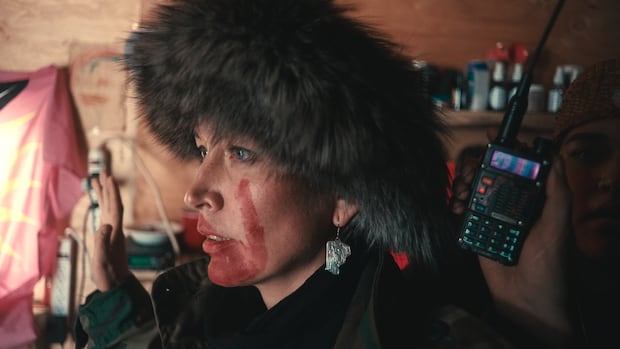Indigenous·NewA Wet’suwet’en leader convicted after blocking work on the Coastal GasLink pipeline addressed a B.C. Supreme Court at the end of sentencing arguments on Thursday, telling the judge her land “has never been ceded or surrendered.”Crown and defence lawyers delivered sentencing arguments on Wednesday and Thursday in Smithers, B.C.Edzi’u Loverin · CBC News · Posted: Oct 17, 2025 9:54 AM EDT | Last Updated: 34 minutes agoSleydo’, also known as Molly Wickham, a wing chief of Cas Yikh, a house group of the Gidimt’en Clan of the Wet’suwet’en Nation in B.C., holds up her hands during her arrest on Nov. 19, 2021. Sleydo’ was one of three people convicted for blocking work on the Coastal GasLink pipeline, with sentencing expected later today. (EyeSteelFilm)A Wet’suwet’en leader convicted after blocking work on the Coastal GasLink pipeline addressed a B.C. Supreme Court at the end of sentencing arguments on Thursday, telling the judge her land “has never been ceded or surrendered.””We are more than just our songs and dances. Our ancestors said, we are the land, and the land is us. Our laws flow from the land, we are nothing without it,” said Sleydo’ at the end of the hearing.Sleydo’, also known as Molly Wickham, a wing chief of the Gidimt’en Clan of the Wet’suwet’en Nation, was one of three people found guilty of criminal contempt last year for breaking a 2019 injunction against people blocking work on the Coastal GasLink (CGL) pipeline in November 2021.Shaylynn Sampson, a Gitxsan woman with Wet’suwet’en family ties, and Corey Jocko, who is Kanien’kehá:ka, were also convicted.Justice Michael Tammen is expected to announce a decision on Friday, after sentencing arguments were delivered over Wednesday and Thursday in Smithers, B.C.Crown seeks jail time; defence wants time servedThe Crown is seeking jail time for the accused, saying it is needed to preserve the “rule of law” and deter both those convicted and the wider public “from similar actions.”“This sentencing is about how these three contemners acted, on how those views, and how those actions, undermine the court’s reputation and the rule of law,” said Crown lawyer Paul Battin. But defence lawyer Frances Mahon argued more jail time would further degrade the integrity of the court following an abuse of process ruling , and argued time served would be a more appropriate sentence.In February, Sleydo’, Jocko and Sampson brought forward the abuse of process application in that alleged RCMP used excessive force during their arrests.Justice Tammen found some of the accused’s Section 7 rights— life, liberty, and security of person — were breached during arrest, and referenced recordings where several police officers on two separate occasions compared Sleydo’ and Sampson, who wore a red handprint painted on their faces, to orcs in the movie The Lord of the Rings.“The court found that these comments were racist, grossly offensive, dehumanizing.… They mocked a well-known symbol of the missing and murdered Indigenous women, girls and two-spirit,” said Mahon.“What does it say to Canadians, to international observers and to Indigenous people, that victims of this hideous racism will be sent to jail to serve further time, notwithstanding this misconduct.”Battin said the Crown doesn’t argue that the comments were disrespectful, but said a sentence reduction somewhere in the range of two to five days would address that.He argued custodial sentences were warranted due to social media posts that called for others to join the blockade after the injunction was imposed, the risk to CGL workers who were unable to leave the blockade area for four days, and the risk to RCMP enforcing the injunction.’We’re talking about this specific history’Battin also said the beliefs of Sleydo’, Jocko and Sampson did not justify their choice to defy a court order, and referenced prior Court of Appeal decisions where it did not factor the beliefs an Indigenous person convicted of criminal contempt into sentencing.But Mahon said history must be taken to account, referencing the 1997 Delgamuukw decision and a memorandum of understanding (MOU) signed in 2020 between Wet’suwet’en hereditary chiefs and the federal and provincial governments, arguing neither have been implemented in a meaningful way. “We’re not talking about beliefs here,” said Mahon. “We’re talking about this specific history, which has, in essence, constrained the circumstances of the Wet’suwet’en to prove its title beyond the recognition that the provincial and federal governments have not extinguished it.”“This is an integral component of why they have come before the courts,” said Mahon.The Crown is seeking a sentence of 30 days for Sleydo’, 25 days for Jocko and 20 days for Sampson, with reductions for time served, and the two- to five-day credit proposed as a remedy as a result of the abuse of process ruling .The defence is seeking a sentence of time served or a conditional sentence order, with 100 to 150 hours of community service.“If the court concludes that additional jail time is required, the sentence could be served in the community to respond to the continued overincarceration of Indigenous people,” said Mahon.The protest activity delayed, but did not stop, the completion of the 670-kilometre pipeline, which carries natural gas across northern British Columbia to a terminal in Kitimat for export to Asia. LNG Canada exported its first shipment in June.ABOUT THE AUTHOREdzi’u Loverin is graduate of CBC’s Indigenous Pathways Program and has reported in Vancouver and Winnipeg since 2024. Edzi’u is a member of the Taku River Tlingit First Nation and a registered member of the Tahltan Nation, but is currently based in xʷməθkʷəy̓əm, Sḵwx̱wú7mesh, and səlilwətaɬ territories. You can email Edzi’u at edziu.loverin@cbc.ca with story ideas.
Thursday, 5 Mar 2026
Canada – The Illusion
Search
Have an existing account?
Sign In
© 2022 Foxiz News Network. Ruby Design Company. All Rights Reserved.
You May also Like
- More News:
- history
- Standing Bear Network
- John Gonzalez
- ᐊᔭᐦᑊ ayahp — It happened
- Creation
- Beneath the Water
- Olympic gold medal
- Jim Thorpe
- type O blood
- the bringer of life
- Raven
- Wás’agi
- NoiseCat
- 'Sugarcane'
- The rivers still sing
- ᑲᓂᐸᐏᐟ ᒪᐢᑿ
- ᐅᑳᐤ okâw — We remember
- ᐊᓂᓈᐯᐃᐧᐣ aninâpêwin — Truth
- This is what it means to be human.
- Nokoma











